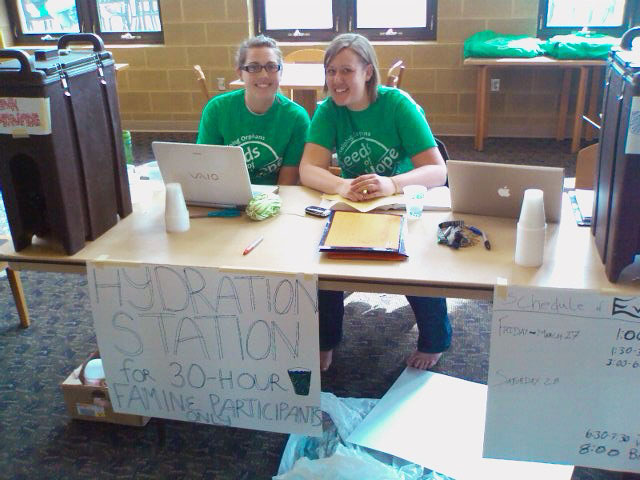Melissa MacGregor had skipped both breakfast and lunch. She was well on her way to fasting a complete 30 hours. Unfortunately, it was March 20, a full week before the 30 hour famine was scheduled to take place.
MacGregor and Lydie Assefa, both seniors, were among 154 students who signed up to donate three meals at the dining hall over the weekend of March 27 to 28. Their sacrifice supported Seeds of Hope, a non-profit organization dedicated to helping children infected with or orphaned by HIV/AIDS.Student participants were asked to either find pledges, donate their own money to Seeds of Hope or give up three meals at the dining hall. Participants then refrained from eating for 30 hours.
Sodexo, the food services provider at the college, agreed to donate the monetary equivalent of donated meals to the Seeds of Hope organization. Donations from meals totaled $1,540 and $602 from pledges, resulting in a total of $2,142 donated to Seeds of Hope.
Students were not required to both give up three meals and fast 30 hours, but the rules were a little ambiguous for many.
While discussing these rules, McGregor discovered she was a week early in fasting. “I think in our argument in figuring out if it was acceptable to eat or not, [Lydie and I] checked online to see and then saw it was the wrong date,” MacGregor said. After realizing her mistake, MacGregor waited another week to successfully fast 30 hours during the scheduled event.
Fasting began at 2 a.m. on March 27 and lasted until 8 a.m. the next day. “I would say I achieved the 30 hours because of the practice the week before,” MacGregor said.
Many students found hunger to be most persistent during late night hours.
Noah Weaverdyck, a sophomore, donated three meals but didn’t make it through the 30 hour famine. “I must admit I actually gave [in] after 24 hours, at 2 a.m.,” said Weaverdyck. “I really wanted to eat some chips and salsa.”
MacGregor said she drank a lot of juice and chewed a pack of gum throughout the day to keep her mind off food. The first thing she ate after 30 hours of fasting was three oranges. “I love oranges, so it was amazing,” MacGregor said.
For others, the famine came during a bout of the flu going around campus, making it easier to resist eating.
Jennifer Cree, a senior, donated $30 of her own money to Seeds of Hope and completed the 30 hour famine after having battled the flu for almost a week. “It was like doing a seven-day fast, from having the flu,” Cree said.
Cree stayed in her room most of the day but kept hydrated by purchasing juice from the LeafRaker.
The hydration stations available in the Connector and dining hall also helped students remember to drink fluids. Weaverdyck took advantage of the pink lemonade station.
“[The famine] is always a good reminder of what a lot of people have to go through almost every day,” Weaverdyck said.
For more information on Seeds of Hope, visit www.seedsofhopecm.com.



